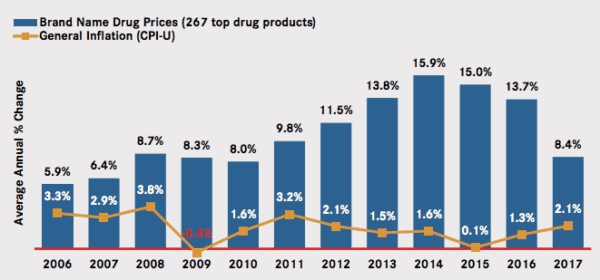
Elections have consequences, and one positive consequence of the midterms is that the new House majority is serious about reducing drug prices for seniors. Last week, Democrats introduced legislation to allow Medicare to negotiate prices directly with pharmaceutical companies. This week, the new chairman of a key House committee, Rep. Elijah Cummings (D-MD), announced an investigation into skyrocketing drug costs.
“It’s time to provide much-needed relief to the American people. They should not have to decide between paying their bills or paying for their prescriptions. We need real and immediate action to lower drug prices in this country. The American people deserve that, and I will do everything I can to help deliver that for them.” – Rep. Elijah Cummings
Cummings has just sent letters to 12 large drug companies demanding details and documents about the companies’ pricing practices. They include industry giants like AstraZeneca, Eli Lilly, Johnson & Johnson, Novartis, Novo Nordisk, and Pfizer, whose profits and CEO compensations are – to say the least – quite healthy.
Despite tepid pleas from the Trump administration, Big Pharma hiked the prices of hundreds of medications at the beginning of the year. According to Cummings’ office, some 94% of the most often prescribed brand-name drugs more than doubled in price between 2005 and 2017.
Meanwhile, the percentage of Medicare Part D beneficiaries who paid at least $2,000 out-of-pocket for prescriptions nearly doubled from 2011 to 2015.

Source: AARP Progressive Policy Institute
Seniors living on fixed incomes are the least able to afford rising drug prices. The average Medicare beneficiary has about $25,000 in annual income, which is only 200% of the federal poverty level. Too many seniors still must choose between groceries and prescription drugs – or cutting pills in half to save money.
This is not lost on Congressman Cummings and like-minded elected leaders on Capitol Hill. Rep. Cummings and Senator Bernie Sanders (I-VT) rolled out an ambitious package of bills last week that could make a serious dent in drug prices:
- The Prescription Drug Price Relief Act, which would peg the price of prescription drugs in the United States to the median price in five major countries: Canada, the United Kingdom, France, Germany and Japan;
- The Medicare Drug Price Negotiation Act, which would direct the Secretary of Health and Human Services (HHS) to negotiate lower prices for prescription drugs under Medicare Part D;
- The Affordable and Safe Prescription Drug Importation Act, which would allow patients, pharmacists and wholesalers to import safe, affordable medicine from Canada and other major countries.
If enacted, these bills would save Americans and the federal government billions of dollars in prescription drug costs. In fact, Stat news reported that the government could have saved more than $14 billion on the 50 most frequently prescribed medications in 2016 if Medicare were able to negotiate prices with Big Pharma like the Department of Veterans Affairs does.
There are myriad other proposals to bring down drug prices, recapped nicely by Dylan Scott in Vox earlier this week. These include measures to expedite the production of lower-priced generic drugs, cap patients’ out-of-pocket costs, allow the government to manufacture certain medications, and reform the U.S. patent system. “The current proposals on the table range from the realistic to the purely aspirational,” Scott observes. “Drug prices are a thorny problem. What we do know for sure is people want something done.”
******
Watch our discussion about prescription drug prices on “Behind the Headlines” on Facebook Live.


